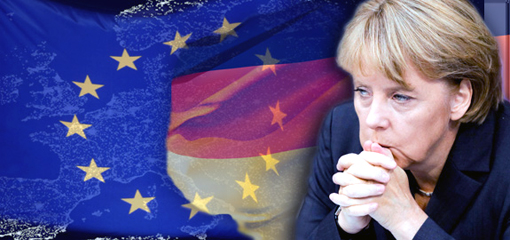By FT
German Chancellor Angela Merkel has come under intense pressure from her own coalition to stick to her tough line over Greece ahead of a high-profile visit to Berlin on Monday by the radical Greek prime minister Alexis Tsipras.
The calls from leading figures in her conservative CDU/CSU bloc and its social democrat ally highlight Ms Merkel’s limited room for manoeuvre as she prepares for her first full-length meeting with Mr Tsipras.
She and the Greek premier have both made clear that Monday’s Berlin talks are not planned as negotiations over the current eurozone’s rescue plan, which has generated huge hostility in Athens. Both have said they want to speak more generally – and improve bilateral ties which have been severely strained in recent weeks by the dispute over the terms of further financial aid for Greece.
The bilateral meeting follows a tense encounter in Brussels last week between Ms Tsipras and fellow eurozone leaders, including Ms Merkel, which ended with the participants boasting of an agreement – only to disagree about the contents.
Ms Merkel insisted that the starting point for negotiations was the list of economic reforms included in the current rescue programme and left unfinished by the previous Greek government. But Mr Tsipras retorted: “Forget the commitment of the previous government.”
The chancellor’s position was strongly backed by Volker Kauder, parliamentary leader of her CDU party, who on Sunday ruled out any rescue programme other than the current plan. “We are not thinking about any other programme,” he told Handelsblatt newspaper.
He was echoed by Thomas Oppermann, his SPD counterpart, who told Spiegel magazine on Sunday that Mr Tsipras had promised to present a full list of reforms. “I expect that he will present this list in his talk with chancellor Merkel on Monday. I finally want to know whether Greece is ready for real reforms or not.”
<
The tabular content relating to this article is not available to view. Apologies in advance for the inconvenience caused.
>Ms Merkel issued the invitation to Mr Tsipras last Monday amid growing signs that the dispute with Greece was spinning out of control amid tense exchanges between the two countries’ finance ministers – the stern veteran Wolfgang Schauble and the maverick Marxist economics professor Yanis Varoufakis.
As Ms Merkel told the German parliament on Thursday, she remains committed to keeping the eurozone together, with Greece as a member, saying: “If the euro fails, then Europe fails.” A senior chancellery official said: “We will always do everything to keep the problem manageable.”
But, as Ms Merkel has also made clear, she will not keep her pledge at any price. She told the German parliament and her eurozone partners, that any deal had to come within the lines laid down by the eurozone group – and would not be settled in any backroom discussions.
She told the Bundestag, she wants to find out more about Mr Tsipras’ policies and is ready for disagreements: “We will have time [on Monday], to talk at length with each other, and perhaps also to argue.” Nobody should expect a deal out of the meeting, she added.
<>Mr Tsipras said in a statement to the Kathimerini newspaper that the meeting would give time to “discuss the important issues that are burdening Europe as well as improve bilateral relations between the two countries”.
But the Greek prime minister has highlighted that he is willing to talk to alternative partners, bringing forward to next month a visit to Russian president Vladimir Putin in Moscow.
Underlying the deep differences between the German and Greek leaders is a yawning gap in public opinion. In Greece, voters backed Mr Tsipras’s leftist Syriza-led government precisely because he promised an end to eurozone-mandated austerity policies.
In Germany, public opinion is increasingly opposed to offering more rescue funds for Athens – and willing to contemplate Greece leaving the eurozone. In a YouGov opinion poll published last week, 59 per cent of respondents said they would favour Grexit, compared to 48 per cent in a similar poll in mid-February.
However, there is some sympathy in Germany for Greek demands for second world war reparations, that Athens has aired with growing force in recent weeks. While political leaders insist reparations and the current financial rescue must be kept separate, they say Berlin bears some moral responsibility for Nazi-era crimes. There is increasing support in Germany for expanding a €1m fund set up last year, to promote Greek-German co-operation, for example with scholarships for young Greeks.



















